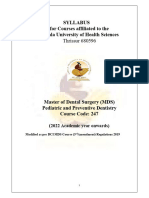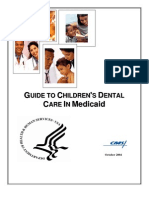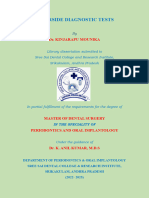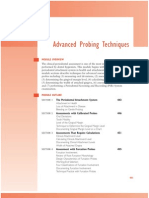Ethics in Dentistry - A Review
Ethics in Dentistry - A Review
Uploaded by
NabielaCopyright:
Available Formats
Ethics in Dentistry - A Review
Ethics in Dentistry - A Review
Uploaded by
NabielaCopyright
Available Formats
Share this document
Did you find this document useful?
Is this content inappropriate?
Copyright:
Available Formats
Ethics in Dentistry - A Review
Ethics in Dentistry - A Review
Uploaded by
NabielaCopyright:
Available Formats
International Journal of Health Sciences and Research
www.ijhsr.org ISSN: 2249-9571
Review Article
Ethics in Dentistry - A Review
Monika Prasad1, Manjunath C2, Archana Krishnamurthy3, Shilpashree K. B4,
Aishwarya Sampath1, Shefali Jaiswal1, AnkitMohapatra5
1
Post Graduate Student, 2Professor, 3Professor & Head, 4Reader, 5Assistant Professor,
Department of Public Health Dentistry, the Oxford Dental College, India
Corresponding Author: Monika Prasad
ABSTRACT
Background: This article focuses on ethics among dentists. Dental ethics would mean moral duties
and obligations of the dentist towards his patients, professional colleagues and to the society. There
are four basic principles which act as guidelines for decision making.
Findings: Ethics forms an important part of a profession. The code of ethics prescribed by regulatory
bodies as well as professional associations act as a guiding light in distinguishing between the right
and the wrong, observing one‟s duties and maintaining good interpersonal relationships.
Key words: Dentistry, Ethics, Moral, Profession.
INTRODUCTION the conduct of population based research
The word ethics comes from the and practice. Macro ethics can be defined as
Greek ethos originally meaning character or set of principles designed to protect the
conduct. It is typically used interchangeably human dignity, integrity, self determination,
with the word moral which is derived from confidentiality, rights and health of
the Latin word mores, which means customs population and the people comprising them.
[3]
or habits. Together these two terms refer to
conduct, character, and motivations It is intended to heighten ethical
involved in moral acts. Ethics are an responsibility, promote ethical conduct in
unwritten code of conduct that encompasses dentistry, advance dialogue on ethical
both professional conduct and judgement. [1] issues, and stimulate further reflection on
The understanding of ethics can also be common ethical problems in dental practice.
helped by defining some things that ethics is It is not intended to solve specific ethical
not: it is not a set of rules or restrictions, it is dilemmas. So after coming across above
not religion, and it is neither relative nor circumstances, Dentists are strongly
subjective. [2] encouraged to further their understanding of
Dental ethics would mean moral ethics and ethical issues beyond this
duties and obligations of the dentist towards introduction. Dentists should familiarize
his patients, professional colleagues and to themselves with the prevailing laws,
the society. These help support autonomy regulations, and standards that affect their
and self-determination, protect the decisions. [4]
vulnerable and promote the welfare and
equality of human beings. These principles ADA Principles of Ethics and Code of
may be called “micro-ethical” principles Professional Conduct (ADA Code):
where as “macro-ethical” principles guide
International Journal of Health Sciences & Research (www.ijhsr.org) 238
Vol.9; Issue: 3; March 2019
Monika Prasad et.al. Ethics in Dentistry - A Review
It is, in effect, a written expression of the care and the need to maintain public
obligations arising from the implied contract interest.
between the dental profession and society.
There are five fundamental principles that Nature of Ethical Problems:
form the foundation of the ADA Code: Justification; providing service only when it
patient autonomy, non maleficence, is convenient; refusing to accept
beneficence, justice and veracity. responsibility when treatment fails
PATIENT AUTONOMY (“self- prematurely.
governance”): This principle expresses the
concept that professionals have a duty to How Dentists Perceive Ethical Problems:
treat the patient according to the patient‟s Every clinical, scientific, or legal problem
desires, within the bounds of accepted involves an evaluative component.
treatment, and to protect the patient‟s Evaluation may become an ethical issue
confidentiality. when the dentist realizes that the evaluation
NONMALEFICENCE (“do no harm”): This involves a tradeoff between the value of
principle expresses the concept that reducing pain and other values that the
professionals have a duty to protect the patient may affirm.
patient from harm.
BENEFICENCE (“do good”): This Ethical versus Legal:
principle expresses the concept that People sometimes confuse ethical and legal
professionals have a duty to act for the problems. Both the ethical and the legal
benefit of others and the dentist‟s primary involve evaluations. Ethical evaluations,
obligation is service to the patient and the however, appeal to what is believed to be an
public-at-large. ultimate standard of right and wrong. Legal
JUSTICE (“fairness”): This principle evaluations appeal to the evaluations of a
expresses the concept that the dental particular society. It may be legal for a
profession should actively seek allies general dentists to provide comprehensive
throughout society on specific activities that orthodontic care without adequate training
will help improve access to care for all. but unethical to do so.
VERACITY (“truthfulness”): Under this Ethical issues faced by dentists: the clinical
principle, the dentist‟s primary obligations ethical situations referred to already were
include respecting the position of trust predominantly derived from work done by
inherent in the dentist-patient relationship, Bebeau and Spiedal with a group of
communicating truthfully and without Minnesota dentists:
deception, and maintaining intellectual Quality of care: Care might be deemed
integrity. [5] inadequate if it involves the delivery of
substandard of care without the patient‟s
Dentistry as reflection of medicine: knowledge, without consideration of the
The recent growth of ethics literature has patient‟s wishes, without justification by
been significant but is nearly 15 years virtue of special circumstances, and
behind medicine in terms of its analysis of motivated by motivational gain.
dental related ethical problems. The Advertising: The ADA code of ethics
American dental association‟s commission states that “no dentists shall advertise or
on dental education has set standards for solicit patients in any form of
ethics education and has made it a communication in a manner that is false
requirement for accreditation. In clinical or misleading in any material respect”.
dentistry, it has focused on the ethical Patient autonomy: Issues of informed
standards of the profession in sense of consent and the need to put the patient‟s
concerns for excellence in the quality of interest first are considered very
important. Informed consent is a
International Journal of Health Sciences & Research (www.ijhsr.org) 239
Vol.9; Issue: 3; March 2019
Monika Prasad et.al. Ethics in Dentistry - A Review
significant dental challenge to the autonomy, (4) the dentists preferred practice
dentist because of the large number of values, (5) esthetic values and (6)
different materials and different efficiency.
techniques available for the same or The patient’s life and general health: The
similar problems. sustaining of life and the promotion of
Conflicts with patients: One category of overall health is the central concern of all
conflicts deals with those precipitated by practitioners and patients. Under normal
the dentist. For example consider the conditions, dentists should not undertake
patient who is unable or unwilling to treatment that will significantly jeopardize
comply with the home care expectations the life or health of patients. For example, a
of the dentist while the dentist wonders man with malignant hyperthermia who
whether continuation of treatment is received serious facial trauma would have
justifiable. Another category of conflicts risked death had he been given general
with patients includes those precipitated anesthesia for corrective surgery.
by the patient. The most frequent The patient’s oral health: Oral health for the
situation is the patient who requests a purposes of this discussion includes
procedure that is contrary to the training appropriate and pain free oral functioning.
and standards of the dentist. An example What is appropriate functioning on such
is the request for complete mouth factors as age, stage of development,
extraction by a patient who has an general health and the patient‟s
essentially intact dentition that can requirements for function. In the case of a
easily be saved. patient with severe periodontal disease and
Justice: Several concerns are over issues poor past oral hygiene practices, it is
of justice. What are the obligations valuable to stress the need for more strict
regarding treatment for patients not of home care standards before any treatment is
record who are in pain, for patients with standard.
AIDS, or for patients whose prior The patient’s autonomy: A third concept
treatment has failed. Is the dentist that is valued by patients and dentists alike
obligated provide free services? If so for is autonomy or freedom, in the context of
whom. health care, autonomy refers to the ability of
Intra professional relationship: Among patients to make their own health care
the most difficult problems are those decisions that reflect their own values and
where colleagues should be confronted goals. If patient, for example, were to
with their incompetence or when request treatment that would appreciably
incompetence should be reported. compromise oral health, “ and if the dentist
Financial transactions: A final series of acted on the patient‟s request out of respect
ethical issues concerns financial for patient‟s autonomy and did the
transactions pertaining to patients. Some procedure, the dentist would be acting
of these issues involve direct unprofessionally”.
transactions such as requests by patients The dentist’s preferred practice values:
to falsify billing, decisions on who pays. During their formal education, dentists
When treatment fails, the charging of receive powerful messages, regarding
different fees for the same service under choice of treatment that often becomes
varying circumstances. incorporated in their values of preferred
Values in clinical dental ethics: practice. Examples include the restoration
OZAR and SOKOL‟S proposal for six rather than amalgam restorations in
values in dentistry. The values in compromised teeth, and the use of crowns
hierarchical order are as follows: (1) the rather than amalgam restorations in
patient‟s life and general health, (2) the compromised teeth.
patient‟s oral health, (3) the patient‟s
International Journal of Health Sciences & Research (www.ijhsr.org) 240
Vol.9; Issue: 3; March 2019
Monika Prasad et.al. Ethics in Dentistry - A Review
Esthetic value: Dentists recognise that facial • Not much basis in reality
and intraoral appearances are important to
patients, and they routinely consider esthetic COMMERCIAL MODEL:
factors in their important to patients, and • Dentist has something to sell; patient may
they routinely consider esthetic factors in or may not want to buy it
their treatment recommendations. • Standard "market place" principles apply
Efficiency in the use of resources: • Patient's need for care is not the direct
Efficiency is something that virtually all determinant of the dentist's actions
dentists perceive as essential for operation • Dentist and patient on equal ground
of a successful practice. There is nothing
unprofessional in a dentists working to INTERACTIVE MODEL:
control costs- time, effort, or materials- • Dentist and patient are equal partners
provided the other central values are also • Preservation and maximization of patient
given their due. autonomy
The structure of professions and the • Dentist enhances patient's decision making
responsibilities of professionals: Students capacity
who select the profession of dentistry give a • Dentist contributes expertise into the
variety of reasons for their choice. Among decision-making process. [1]
them are the ability to earn a good income,
the prospect of independent employment THE FIDUCIARY RELATION:
and the opportunity to serve the public. A fiduciary relationship is based on trust
Definition of Profession: The American and confidence that commitments between
College of Dentists defines a profession as parties will be honoured; it exists whenever
(a) an occupation involving relatively long a doctor and a patient establish a
and specialized preparation on the level of professional connection. Because the patient
higher education and governed by a special should be an active participant in the
code of ethics. By contrast, Starr, a relationship, these commitments are a two
respected sociologist of the professions, way street. However, given the unequal
defines it as: “an occupation that regulates knowledge and skills of the two parties, it is
itself through systematic, required training especially important that health care
and collegial discipline; that has a base in provider be worthy of that trust.
technical, specialised knowledge, and that We need to have some basic understanding
has a service rather than profit orientation, of the meaning of morality and ethics.
enshrined in its code of ethics. [6] Moral and non-moral evaluations: a moral
or ethical evaluation must meet certain
RELATIONSHIPS WITH PATIENTS: characteristics:
Doctor-Patient Relationship Models: Ultimacy: Perhaps the most critical
1. Guide model characteristic of moral or ethical
2. Agent model evaluation is that the standard by which
3. Commercial model the judgement is made is deemed
4. Interactive model ultimate, i.e., there seems to be no
GUIDE MODEL: higher standard by which one might
• Relationship based on dentist's expertise judge. The judgement has what the
and the patient's lack of it philosopher JOHN RAWLS calls
• Patient does not make any contribution to “finality.”
dental decisions Universality: Moral or Ethical
• Dentist is the judge of the patient's needs evaluations are often also said to be
AGENT MODEL: universal. This means that if other
• All dental decisions made by patient people are considering exactly the same
• Dentist provides service for patient choices action or character trait in exactly the
International Journal of Health Sciences & Research (www.ijhsr.org) 241
Vol.9; Issue: 3; March 2019
Monika Prasad et.al. Ethics in Dentistry - A Review
same situation. avoiding harm are considered the only
Altruism or neutralism: Judgements morally relevant feature of actions.
cannot be tailored to the advantage of
the person making the judgement i.e. DENTOLOGICAL THEORIES: Many
cannot be crafted to promote the ethical theories include principles that tend
advantage of the person stating them. to make actions right yet do not focus solely
Publicity: Another criterion that tends to on maximizing good consequences and
make evaluations moral is that one must minimizing bad consequences. Whenever
be willing to publicly state the the right action, rule, or practice is
evaluation and the basis on which it is determined at least in part by principles
made. other than those that focus on maximizing
Ordering: Finally, any set of principles, net good consequences, the theory is
rules or character assessments should deontological.
provide a basis for conflicting claims.
The various theories of ethics: PRIMA FACIE DUTIES AND DUTY
PROPER: One‟s duty proper takes into
ALTERNATIVE THEORIES OF account all moral principles, whereas one‟s
NORMATIVE ETHICS: prima facie duty considers only one moral
Normative ethical theories are not addressed dimension at a time.
specifically in studies of health care ethics,
but the basic issues will be similar in any VIRTUE THEORY: We focus primarily
kind of normative ethical theory: on the ethics of actions and therefore must
judgements about which kinds of actions or clarify the principles that indicate what
rules are right (action theory), which non makes actions or practices right, keeping in
moral things are good or bad(value theory mind that we can also assess the virtues of
or axiology) and which traits of character the dentist involved. [6]
are desirable(virtue theory).
DISCUSSION
ACTION THEORY: A theory of right Ethics is a subject which, of
action articulates general principles that necessity, is considered in any and all walks
tend to make actions right or wrong of life either consciously or unconsciously.
according to the ultimate moral standard of It is altered by its environments and
reference. These principles necessarily are everything that goes to make up the
general because they have to be limited to a environment.
manageable number that are understandable According to Thompson HE, in a
to the ordinary person. They are principles profession there is something, whether
such as beneficence, non-maleficence, tangible or intangible, that places service
veracity, fidelity, respect for autonomy, and above material gain, battles all forces which
justice. make for disintegration or demoralization of
our highest ideals, lights in defense of honor
UTILITARIANISM AND of the profession and protection of material
CONSEQUENTIALISTIC THEORIES: and moral welfare of the people. [7]
One major group of theories that is Johnson, in 1946, stated that
particularly dominant in the ethics of health philosophical approaches were better than a
professionals, including dentists, holds that dualistic approach to ethics, which may
what really matters is the consequences of provide dental professionals with the
actions. The dominant principles for such understanding to fashion a more eclectic
theories are beneficence and non- approach to professional personal ethics. [8]
maleficence, where doing good and Brinton, in 1950, stated that ethics
was only a matter of two paths to follow and
International Journal of Health Sciences & Research (www.ijhsr.org) 242
Vol.9; Issue: 3; March 2019
Monika Prasad et.al. Ethics in Dentistry - A Review
it was intensified by the fact that there was boards, as these were framed almost three
no provision for absolution of sins. decades ago.
Durant, in 1954, stated in his book,
„The story of philosophy‟ that the ancient CONCLUSION
Greek philosophers Plato and Aristotle Ethics in our practice is of immense
viewed ethics as a value to be strived fork, significance today. Ethical values should be
which was the basis of harmony in life and inculcated in every dental student. As a
personal happiness. professional we should:
According to B.F. Skinner, in 1971, 1. Be aware of the responsibilities that
ethics was a matter of performance we accept when entering the dental
discrepancy, devoid of personal values, and profession.
consisting mainly of activities that had to be 2. Meet the standards of competence,
learned by the management of the care and conduct while rendering service.
contingencies. 3. Above all the care of patients should
Nash, in 1984, stated that ethics was be our first concern.
the key to expressing mutual respect among Hence ethics forms an important dimension
people. of a profession. The code of ethics
Warnick BR et al, They propose an prescribed by regulatory bodies as well as
approach to the professional ethics of professional associations act as a guiding
teaching that employs a case-analysis light in distinguishing between the right and
framework specifically tailored to address the wrong, observing one‟s duties and
the practice of teaching. [9] maintaining good interpersonal
There exists a need to teach professional relationships.
ethics in dentistry and the appropriate goals
for teaching professional ethics have been REFERENCES
identified: 1. Bruscino T. Basic Ethics in Dentistry.
• To sensitize student dentists to the moral The Academy of Dental Learning &
dimensions of professional life and practice OSHA Training.2012;16-25.
• To develop in student dentists, the skills of 2. Burt B, Eklund S. Dentistry, Dental
ethical analysis Practice, and the Community. 6th ed.
• To foster in student dentists respect for Elsevier; 2005. p.25-35.
disagreement and toleration of ambiguity 3. Peter S. Essentials Of Public Health
• To assist student dentists in explicating the Dentistry. 5th ed. Arya Publications;
moral responsibilities incurred in becoming 2013. p.131-143.
a member of the profession of dentistry 4. Ethics Handbook for Dentists-American
• To motivate the student dentists‟ continued College of Dentist. Available from
learning in the field of professional ethics. https://acd.org/PDF/Ethics_Handbook_f
[8]
or_Dentists_(s).pdf.(accessed27March
The study by Sabarinath B et al [10] and 2017).
Acharya AK et al, [11] concludes that ethics 5. ADA Principles of Ethics and Code of
are not strictly followed by the dental Professional Conduct. Available from
practitioners in their clinical practice. A www.ada.org/about-the-ada/principles-
proper ethical committee should be formed of-ethics-code-of-professional-conduct.
by the state dental councils to monitor the (accessed 27May2017).
practitioners and dental clinics. Also, 6. Rule JT, Veatch RM. Ethical Questions
regulatory bodies like state dental councils in Dentistry. 2nd ed. Quintessence
and DCI should think about the Publishing Co, Inc; 2004. p.3-55.
revision/modification of certain codes of 7. Thompson HE. Ethics in Dentistry. The
ethics, particularly with respect to the name Dentoscope. 1947;21:(2).
International Journal of Health Sciences & Research (www.ijhsr.org) 243
Vol.9; Issue: 3; March 2019
Monika Prasad et.al. Ethics in Dentistry - A Review
8. Prasad DK, Hegde C, Jain A, Shetty M. 10. Sabarinath B, Sivapathasundharam B.
Philosophy and principles of ethics: Its Ethics in dentistry. Journal of Education
applications in dental practice. J Educ and Ethics in Dentistry. 2011;1:(1).
Ethics Dent. 2011;1:2-6. 11. Acharya AK, Gupta R, Kunsi SR, Goud
9. Warnick BR, Silverman SK. A VS, Muralidharan S. Ethical Practices of
Framework for Professional Ethics Dentists in Raichur City and its
Courses in Teacher Education. Journal Implications in Indian Set-up. Indian J
of Teacher Education. 2011;62:(3). Stomatol. 2014;5(2):77-80.
How to cite this article: Prasad M, Manjunath C, Krishnamurthy A et.al. Ethics in dentistry - a
review. Int J Health Sci Res. 2019; 9(3):238-244.
******
International Journal of Health Sciences & Research (www.ijhsr.org) 244
Vol.9; Issue: 3; March 2019
You might also like
- OSCE Checklist Dental History TakingDocument2 pagesOSCE Checklist Dental History TakingDushyanth JakkaNo ratings yet
- Ethical Questions in DentistryDocument4 pagesEthical Questions in DentistryFilip BijanićNo ratings yet
- Lockwood David Social Integration and System Integration PDFDocument8 pagesLockwood David Social Integration and System Integration PDFEmerson93No ratings yet
- Hans Kelsen's Pure Theory of LawDocument5 pagesHans Kelsen's Pure Theory of LawEverything NewNo ratings yet
- A Module1 Perspective in DentistryDocument12 pagesA Module1 Perspective in DentistryKennet CruzNo ratings yet
- Ethics Lec 1Document9 pagesEthics Lec 1Prince AhmedNo ratings yet
- Interim and Temporary Restoration of Teeth During Endodontic Treatment PDFDocument17 pagesInterim and Temporary Restoration of Teeth During Endodontic Treatment PDFKaren Rod100% (1)
- Ebooks PDFDocument19 pagesEbooks PDFBrindha100% (1)
- Derek Parfit - The Puzzle of Reality Why Does The Universe Exist and Richard Swinburne - ResponseDocument12 pagesDerek Parfit - The Puzzle of Reality Why Does The Universe Exist and Richard Swinburne - Responseforty fiveNo ratings yet
- Treatment Planning in Conservative DentistryDocument9 pagesTreatment Planning in Conservative DentistryteriusNo ratings yet
- Aae Systemic AntibioticsDocument8 pagesAae Systemic AntibioticsIulia CiobanuNo ratings yet
- International Caries Detection and Assessment System (ICDAS) PDFDocument4 pagesInternational Caries Detection and Assessment System (ICDAS) PDFKelvin Jaya AlamNo ratings yet
- Syllabus Dental TechnologyDocument61 pagesSyllabus Dental TechnologyAsad Khan5556No ratings yet
- Treatment Planning 2011Document108 pagesTreatment Planning 2011disen_phNo ratings yet
- Complex OdontomasDocument1 pageComplex OdontomasAnkita AroraNo ratings yet
- Library Dissertation Topics in Conservative Dentistry and EndodonticsDocument5 pagesLibrary Dissertation Topics in Conservative Dentistry and EndodonticsCollegePaperWriterVirginiaBeachNo ratings yet
- MDS Pediatric and Preventive DentistryDocument61 pagesMDS Pediatric and Preventive DentistryfathimapedoNo ratings yet
- General Dental Syllabus and Guidance NotesDocument23 pagesGeneral Dental Syllabus and Guidance NotesRajitha DilhanNo ratings yet
- Infection Control in Dental Practice 2009Document3 pagesInfection Control in Dental Practice 2009wildernest1No ratings yet
- Operative Dentistry Lecture 1Document55 pagesOperative Dentistry Lecture 1Mohsin HabibNo ratings yet
- Iii Bds Pediatric and Preventive DentistryDocument7 pagesIii Bds Pediatric and Preventive DentistryHARSH KUMARNo ratings yet
- Conservative DentistryDocument6 pagesConservative DentistryAbdallah Essam Al-ZireeniNo ratings yet
- Psychological Considerations For Complete Denture Patients.Document7 pagesPsychological Considerations For Complete Denture Patients.Prateek MishraNo ratings yet
- Epidemiology of Dental CariesDocument24 pagesEpidemiology of Dental CariesAnosha Riaz100% (1)
- THE PREVALENCE OF ORAL MUCOSAL LESIONS in MORADABAD - UTTAR PRADESH BY - DR. ANAND PRATAP SINGH SPONSERED BY: - RURAL DENTAL SOCIETY FOR ORAL DISEASE PREVENTION AND CURE - LUCKNOWDocument123 pagesTHE PREVALENCE OF ORAL MUCOSAL LESIONS in MORADABAD - UTTAR PRADESH BY - DR. ANAND PRATAP SINGH SPONSERED BY: - RURAL DENTAL SOCIETY FOR ORAL DISEASE PREVENTION AND CURE - LUCKNOWanandsingh001100% (4)
- Dental Administration 1Document4 pagesDental Administration 1gargisha381No ratings yet
- Library Dissertation in Conservative Dentistry and EndodonticsDocument5 pagesLibrary Dissertation in Conservative Dentistry and EndodonticsWriteMyPersuasivePaperCanadaNo ratings yet
- Conscious Sedation in Pediatric Dentistry A ReviewDocument4 pagesConscious Sedation in Pediatric Dentistry A Reviewjyothi shashidharNo ratings yet
- Conservative DentistryDocument13 pagesConservative DentistryFoysal SirazeeNo ratings yet
- Case Report: M E C C C S AC RDocument3 pagesCase Report: M E C C C S AC RRaja Dean Collin SiagianNo ratings yet
- Doh 125Document40 pagesDoh 125ovov711No ratings yet
- Dental Materials Module 2Document32 pagesDental Materials Module 2David ColonNo ratings yet
- Disability and Oral Health PDFDocument23 pagesDisability and Oral Health PDFWifqi AzliaNo ratings yet
- Caries Risk Assessment by DR TegaDocument45 pagesCaries Risk Assessment by DR TegaRock Ogosobrugwe50% (2)
- Periodicity DentalGuideDocument52 pagesPeriodicity DentalGuideSalam BataienehNo ratings yet
- Dental Fear, Anxiety and Phobia (Final1)Document55 pagesDental Fear, Anxiety and Phobia (Final1)Aj VishwadheebNo ratings yet
- Department of Pedodontics: Submitted By: Shayoni Sen Bds Ivth YearDocument29 pagesDepartment of Pedodontics: Submitted By: Shayoni Sen Bds Ivth YearFarzana ShereenNo ratings yet
- Post and CoreDocument31 pagesPost and CoreSuraj ShahNo ratings yet
- Principles of Dental Ethics IDocument25 pagesPrinciples of Dental Ethics IIbrahim AbdelHadiNo ratings yet
- Evidence Based DentistryDocument7 pagesEvidence Based DentistryAnwar AbbasNo ratings yet
- Dental Foundation Training Portfolio User GuideDocument56 pagesDental Foundation Training Portfolio User GuideEdgar PalmaNo ratings yet
- Dental Consideration of Medically Compromised ChildrenDocument163 pagesDental Consideration of Medically Compromised Childrenpriti adsulNo ratings yet
- Root Canal Irrigants in Primary TeethDocument6 pagesRoot Canal Irrigants in Primary TeethsyedNo ratings yet
- Dental Amalgam: DR - Mohammed Thanzil BDSDocument71 pagesDental Amalgam: DR - Mohammed Thanzil BDSThanzilNo ratings yet
- Introduction To ProsthodonticsDocument98 pagesIntroduction To ProsthodonticsmarwaNo ratings yet
- Dental Auxiliary: Presented By-Sneha Patil (Final Year BDS Student)Document36 pagesDental Auxiliary: Presented By-Sneha Patil (Final Year BDS Student)Mumin RashidNo ratings yet
- Management of Medically Compromised Patients in Oral SurgeryDocument30 pagesManagement of Medically Compromised Patients in Oral SurgeryLaiba Asif RajputNo ratings yet
- Management of Medically Compromised Patients in Dental PracticeDocument6 pagesManagement of Medically Compromised Patients in Dental PracticeAditi ChandraNo ratings yet
- 2023 Prosthodontics Board Part One Exam BlueprintDocument3 pages2023 Prosthodontics Board Part One Exam BlueprintbenrejebyahiaNo ratings yet
- 3D Teeth ReconstructionDocument0 pages3D Teeth ReconstructionSamir Alberita KeljmendiNo ratings yet
- DMFT YoDocument11 pagesDMFT YoAnggi TrianitaNo ratings yet
- Dental Implant Awareness Among Patients in Our Institution in Chennai-Cross-Sectional SurveyDocument4 pagesDental Implant Awareness Among Patients in Our Institution in Chennai-Cross-Sectional SurveyInternational Journal of Innovative Science and Research TechnologyNo ratings yet
- Laboratory Manual Endn 832-1 Endodontics I Spring Quarter 2013Document56 pagesLaboratory Manual Endn 832-1 Endodontics I Spring Quarter 2013Jessa Mae Ferolino100% (2)
- CHD LD FinalDocument129 pagesCHD LD FinalMounika KinjarapuNo ratings yet
- Portfolio Guide MJDFDocument52 pagesPortfolio Guide MJDFSiLv-CrUsNo ratings yet
- AdvocacyTraining Web Version FinalDocument16 pagesAdvocacyTraining Web Version FinalEmanNo ratings yet
- CAL and PSRDocument30 pagesCAL and PSRAhmed Tawfig Gamal0% (1)
- Obturation TechniqueDocument34 pagesObturation TechniqueSaca AnastasiaNo ratings yet
- Australian Dental Journal: Rhinosinusitis in Oral Medicine and DentistryDocument7 pagesAustralian Dental Journal: Rhinosinusitis in Oral Medicine and DentistryVishakha SabooNo ratings yet
- Complete Private Medical Dental CollegeDocument115 pagesComplete Private Medical Dental Collegesabah8800No ratings yet
- Surgical Complications in Oral Implantology: Etiology, Prevention, and ManagementFrom EverandSurgical Complications in Oral Implantology: Etiology, Prevention, and ManagementNo ratings yet
- Color Atlas Basic Technique for Metal Ceramics: An Introduction to Ceramic TechniqueFrom EverandColor Atlas Basic Technique for Metal Ceramics: An Introduction to Ceramic TechniqueNo ratings yet
- Influence of Negotiation, GlideDocument24 pagesInfluence of Negotiation, GlideNabielaNo ratings yet
- Week 8 - Research - Methods - Lecture - Slides - TaggedDocument51 pagesWeek 8 - Research - Methods - Lecture - Slides - TaggedNabielaNo ratings yet
- Saliva Between Normal and Pathological. Important Factors in Determining Systemic and Oral HealthDocument5 pagesSaliva Between Normal and Pathological. Important Factors in Determining Systemic and Oral HealthNabielaNo ratings yet
- The Psychology of Dental Patient Care CommunicatinDocument6 pagesThe Psychology of Dental Patient Care CommunicatinNabielaNo ratings yet
- IMIM Study Guide 2018-2019Document27 pagesIMIM Study Guide 2018-2019NabielaNo ratings yet
- Ethics in Dentistry: June 2018Document5 pagesEthics in Dentistry: June 2018NabielaNo ratings yet
- BeInPM EMJMDs Educational ProgrammeDocument8 pagesBeInPM EMJMDs Educational ProgrammeNabielaNo ratings yet
- Advertisements These Days AreDocument1 pageAdvertisements These Days AreNabielaNo ratings yet
- Acrylic Denture That Causes CancerDocument36 pagesAcrylic Denture That Causes CancerNabielaNo ratings yet
- Resolved: It Is Morally Permissible For Victims To Use Deadly Force As A Deliberate Response To Repeated Domestic ViolenceDocument6 pagesResolved: It Is Morally Permissible For Victims To Use Deadly Force As A Deliberate Response To Repeated Domestic ViolenceNICK RAWNo ratings yet
- TOK EssayDocument5 pagesTOK EssayBerk AlemdarNo ratings yet
- Wilhelm Windelb-WPS OfficeDocument25 pagesWilhelm Windelb-WPS Officemacadaya.rp303No ratings yet
- Artist As Post-Colonial Subject and Journey To The Centre ARAEENDocument19 pagesArtist As Post-Colonial Subject and Journey To The Centre ARAEENsandip luisNo ratings yet
- Scientific PluralismDocument32 pagesScientific PluralismDavid Nicolas Rojas LizamaNo ratings yet
- Austins Theory of SovereigntyDocument7 pagesAustins Theory of SovereigntyManas NemaNo ratings yet
- Thinking About Business EthicsDocument30 pagesThinking About Business EthicsSamNo ratings yet
- FriendDocument2 pagesFriendDianaNo ratings yet
- CasuitryDocument3 pagesCasuitrySoufiane ElabedNo ratings yet
- Populism vs. ElitismDocument7 pagesPopulism vs. Elitismlomaxx21No ratings yet
- SELF EXPLORATION PPT of Human ValueDocument10 pagesSELF EXPLORATION PPT of Human Valueggi2021.2239 Yachna100% (2)
- Lec 2-PHILOSOPHICAL THOUGHTS ON EDUCATIONDocument19 pagesLec 2-PHILOSOPHICAL THOUGHTS ON EDUCATIONcathyNo ratings yet
- Utilitarianism: The Word Deontology Derives From The Greek Words For Duty (Deon) and Science (Or Study) of (Logos)Document1 pageUtilitarianism: The Word Deontology Derives From The Greek Words For Duty (Deon) and Science (Or Study) of (Logos)Jenah Danisse BautistaNo ratings yet
- The Anti-Modern World (John Zerzan)Document6 pagesThe Anti-Modern World (John Zerzan)freebooksNo ratings yet
- Labeling. It Is Likely To Annoy TheDocument20 pagesLabeling. It Is Likely To Annoy TheRaymond Lumbao100% (1)
- Module 14 - Purusartha (Content) - 2Document11 pagesModule 14 - Purusartha (Content) - 2tamodeb2No ratings yet
- IWRBS Module #1 Defining ReligionDocument40 pagesIWRBS Module #1 Defining ReligionLuigi ChristianNo ratings yet
- Urdaneta City University College of Teacher Education and Human SciencesDocument5 pagesUrdaneta City University College of Teacher Education and Human SciencesMark HortalezaNo ratings yet
- Daniel Schwartz - The Political Morality of The Late Scholastics - Civic Life, War and Conscience (2019, Cambridge University Press)Document250 pagesDaniel Schwartz - The Political Morality of The Late Scholastics - Civic Life, War and Conscience (2019, Cambridge University Press)Grzegorz SłowińskiNo ratings yet
- The Threat of Ethical Accountants An Application of Foucault's Concept of Ethics To Accounting Education and Some Thoughts On Ethically Educating For The Other 1999 Critical PerspectivesDocument34 pagesThe Threat of Ethical Accountants An Application of Foucault's Concept of Ethics To Accounting Education and Some Thoughts On Ethically Educating For The Other 1999 Critical PerspectivesiportobelloNo ratings yet
- Ibn Sinas Theory of Gods KnowledgeDocument8 pagesIbn Sinas Theory of Gods KnowledgeMaaritminneNo ratings yet
- Filipino Philosophy: Towards A Nationalistic View: ArticleDocument16 pagesFilipino Philosophy: Towards A Nationalistic View: ArticleDaisymae MallapreNo ratings yet
- 2018 The Conservatism of Robert Nisbet (Bradley Birzer)Document3 pages2018 The Conservatism of Robert Nisbet (Bradley Birzer)Juan Pablo SerraNo ratings yet
- Analogy of The TableDocument2 pagesAnalogy of The TableMay Ang100% (1)
- GSP 207 Summary + Q and A .DONE BY PK?Document156 pagesGSP 207 Summary + Q and A .DONE BY PK?Barry AllenNo ratings yet
- 2011 Maldonado-Torres, Nelson Thinking Through The Decolonial TurnDocument16 pages2011 Maldonado-Torres, Nelson Thinking Through The Decolonial TurnMeyby Soraya Ugueto-PonceNo ratings yet
- EL115 RitualismDocument14 pagesEL115 RitualismCasseopheia MarañoNo ratings yet


































































































